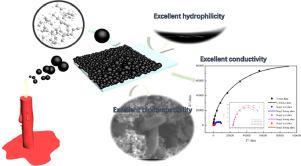Electrochimica Acta ( IF 5.5 ) Pub Date : 2021-10-14 , DOI: 10.1016/j.electacta.2021.139416 Kai-Bo Pu 1 , Kai Zhang 2 , Kun Guo 3 , Booki Min 4 , Qing-Yun Chen 2 , Yun-Hai Wang 1

|
A microbial fuel cell (MFC) is a typical bio-electrochemical system for both wastewater treatment and green energy production. The bioanode is a key factor that affects the performance of MFC. In this study, a novel and low-cost carbon nanoparticles (CNPs) coated titanium bioanode (CNPs/Ti) was prepared. Compared with previous candle soot derived CNPs coating method, the present coating method includes further fuel combustion and heat treatment to improve the film adhesion and hydrophilic properties. This CNPs/Ti bioanode showed not only higher surface area and conductivity but also better biocompatibility. After CNPs modification, the maximal power density increased from 0.625 mW m − 2 to 616 mW m − 2. This power density is also comparable to some carbon materials. Meanwhile, the CNPs/Ti anode was cost-effective. Therefore, this CNPs/Ti composite is a promising anode material in MFCs.
中文翻译:

将碳纳米颗粒牢固地涂覆在钛上作为微生物燃料电池中的高性能阳极
微生物燃料电池(MFC)是一种典型的用于废水处理和绿色能源生产的生物电化学系统。生物阳极是影响MFC性能的关键因素。在这项研究中,制备了一种新型低成本碳纳米粒子 (CNPs) 涂层钛生物阳极 (CNPs/Ti)。与以往的蜡烛烟灰衍生的CNPs包覆方法相比,本发明的包覆方法进一步包括燃料燃烧和热处理,以提高膜的附着力和亲水性。这种 CNPs/Ti 生物阳极不仅具有更高的表面积和电导率,而且具有更好的生物相容性。CNPs修饰后,最大功率密度从0.625 mW m - 2增加到616 mW m - 2. 这种功率密度也可与某些碳材料相媲美。同时,CNPs/Ti 阳极具有成本效益。因此,这种 CNPs/Ti 复合材料是一种很有前途的 MFC 负极材料。









































 京公网安备 11010802027423号
京公网安备 11010802027423号